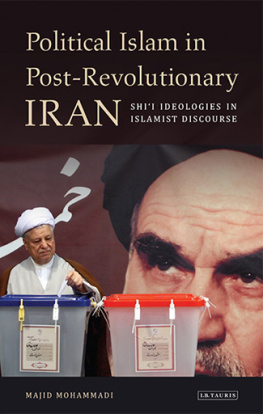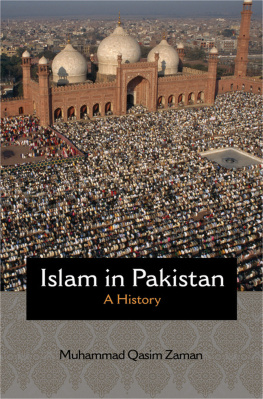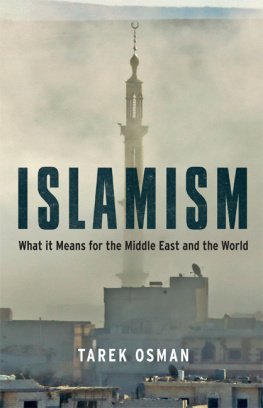
My thanks go to my translator, Alex Gabriel, for his outstanding work, and JS for the wonderful editing, as well to Alexander Simon and Stefan Ulrich Meyer for a great many enriching discussions. Tremendous thanks, in addition, go to all those I interviewed in Egypt, Tunisia, Morocco, Lebanon, Germany, the United Kingdom, and Switzerlandin particular, Mohamed Abdel Rasoul, Momen Adrabbo, Mariam Abdullah, Khaled al-Berry, Momen al-Muhammadi, Hani Fahs, Kacem El Ghazzali, Imad Iddine Habib, Lamya Kaddor, Frank A. Meyer, Shahin Najafi, Said Nashid, Hazem Saghiya, Waddah Sharara, Adel Taouil, and Nadya Zarrougi.

Sociologists and political scientists, among them Ernest Gellner and Francis Fukuyama, tend to view Islamist movements as a source of shared identity for today's Islamic world, much as nationalist ones were for turn-of-the-century Europe. I disagree. Islamism has never been a source of identityit merely acts as a crutch. Islamists need it as a support, and they use it as a weapon. The collective face of Islamists is that of an immobile old man, flailing furiously and swinging his walking stick in all directions. Its followers noisiness betrays weakness, not strength, a lone tantrum amid the wildernessyet weakness has only made Islamists more dangerous.
In the belated German and Italian nations (see ), fascism emerged in an us-against-the-world era; the countries in question were caught between their own cultural and national identities and the realities of world events. Today, Muslims across the globe are likewise finding themselves caught between real life and religious tradition's claims. The same maladjustment that plunged the world into catastrophe twice in the early twentieth century gave rise to Islamic fascism, which boasts countless supporters to this day. Yet no matter how versatile or formidable fascism of any strain may be, in the long run, it remains a doomed philosophy.
Neither the climate leading to its rise nor the loyal support of those preserving it can be sustained indefinitely; fascism's survival requires the fuel of constant war, brainwashed followers faithful to the last, and never-ending acts of self-sacrifice. The question is not whether fascism can be defeated, for in the end, it always is. The question is how long will its defeat take, and what price will its enemies have to pay? By the time European fascism could be overcome, the continent had been subjected to the Second World War's atrocities, with millions of lives lost. The war laid waste not just to cities but also to whole regions, its victors left with the dubious prize of a decades-long cold war. Is the Islamic world likely to be spared the same fate? Can efforts for modernization and democracy in Muslim countries win out without their people paying the bitter price the Western world once had to, and can their failure to do centuries worth of homework pass without consequence? Somehow, I find myself doubtful.
The Muslim Brotherhood in Egypt may have failed for now in its attempts to construct an Islamic state, but this in no sense spells the end for Islamism elsewhereor even for the Brotherhood itself, whose supporters remain active in over seventy other countries, equipped with a sustainable network and billions of dollars. Proclaiming the Islamic caliphate's rebirth, the Islamic State has rapidly brought both Syria and Iraq under its own controlyet it remains a state in name only, possessing no fixed borders, seat of government, passports, currency, or overseas embassies. With any luck, establishing theocracies will only become more difficult for Islamists; while an Islamic dictatorship managed to form thirty-five years ago inside Iran and survives to this day, with both the Cold War and the petrodollar allowing its isolationism, the decades since have made preserving such sealed-off states challenging. In particular, new forms of communication and a global world economy have hamstrung despots attempts to cut their own societies off from goings-on elsewhere and at home, a new glasnost having taken place via the web despite (or perhaps due to) the iron grip of those in power. Sooner or later, even states like Turkmenistan and North Korea will be unable to remain walled off.
On the eve of a conference in Berlin in September 2013, I spoke to Francis Fukuyama about his concept of the end of history. After the Soviet Union's collapse, Fukuyama declared the death of ideologies, predicting only liberal democracy would remain a viable option for the nations of the world. When I asked him if this applied to Islamist ideas, as well as whether Islamic societies would democratize as rapidly, Fukuyama replied that owing to many young Muslims frustrations and most Islamic states poor economic prospects, Islamism's demise was still a far-off eventuality. Unlike China, he said, where ever-broader swathes of the populace would profit from an economic boom and still-tentative free market, Islamic states were still stagnating. Though he felt sure their people would wise up to world events via the Internet, protesting and perhaps deposing the odd dictators, Fukuyama predicted that this would strike them as futile in the end, both economically and otherwisea revolution here, a coup there, but business as usual reasserting itself constantly. Few fundamentalists of any stripe could hope for a more fertile breeding ground.
Islamists may no longer be able to build or maintain nation-states, but they can still keep sharia enclaves alive in the wreckage of failed states like Iraq, Syria, Libya, Somalia, Afghanistan, and Mali. In those still halfway operational, Islamists remain able to carve society in two, disabling its institutions while the demography of Islamic states only points to these tensions sharpening. Sixty-five percent of all Muslims are under thirty, with unemployment rising especially rapidly among young people, whose energy and anger offer fresh fuel for the fires of radicalization. It does not seem as if their generation's potential will be spent any time soon, with the Islamic world's problems mounting faster than its ability to address them.
In Muslim countries, the state is failing to meet young people's needs or offer them improved prospects. Today, governments are also failing to keep them in check, suppressing them with the aid of state security. This is all to the good for Islamists, who leap to faltering authorities aid to offer their services. Insatiable as their desire to seize power is, it tends to be a case of shoring up old sinecures, for even where Islamists lend their support to short-term operations here or there, their true focus never shifts from their long-term goal: victory over unbelievers, by means of martyrdom if necessary. Islamists refuse to believe in their societies reformability through politics or economics. Sovereignty, in their eyes, rests with God rather than with the people. They believe only in the constant battle of good and evil, including the ultimate triumph of the good. Only once the kingdom of God is built on Earth and all humanity adopts Islam will they deem peace or prosperity possible, and until then, their jihad goes on.
At the same time, so many sects and schools of thought clash both politically and theologically that Muslim unity is a fantasy. Muhammad predicted that Muslims would splinter into seventy-two sects, seventy-one of which would follow false doctrines and end up in hell, while a single group, whom he named the redeemed, would still walk the true path. Today, every Muslim sect claims to be this redeemed branch of the faith, smearing all the rest as unbelievers. Herein lies the basis of Sunnite hatred toward Shiites, Ahmadis Sufists, and Alevistsand among Sunnites themselves, numerous strands have long shown mutual animosity, among them Salafists and the Muslim Brotherhood as well Hanbalists, Malikites, Shafi'ites, Hanafists, and Ash'arites. Even in Syria, jihadists opposing Assad continue to attack
Next page












